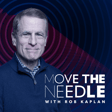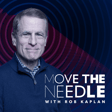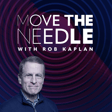
H. Wyman Howard
This is Move The Needle with Rob Kaplan, where we talk to people who lead, innovate, and inspire. Today on Move The Needle, Rob talks with retired Navy Admiral Wyman Howard, who led the Navy SEALS through an amazing year of growth and change. But perhaps his biggest challenge was public awareness of the SEALS post 9/11.
Wyman Howard is a transformational leader with extensive combat mission experience and a proven 32 year record of unparalleled change leadership, creativity and risk mitigation for outcomes of strategic consequence to the security of the United States of America. He is a fourth generation Naval Officer and a 1990 graduate of the United States Naval Academy where he was a member of the Navy crew team.
Wyman is a thought leader in sustainability; disruptive technologies; leadership & human capital assessment; performance; retention; inclusivity; and diversity – with relationships and linkages to global business and foreign government military and intelligence service liaison partners. He is deeply experienced and briefed in geo-political risk and opportunities across disruptive technologies– including multi-domain autonomous systems; electronic warfare; cyber threats and risk mitigations; and commercial, civil, and military & intelligence space sector applications.
A retired U.S. Navy Rear Admiral (Upper Half) with over 32 years in the SEAL Teams and joint special operations, Wyman commanded at all levels of Special Operations, including service as Commander Naval Special Warfare Command, Special Operations Command Central, and Naval Special Warfare Development Group. He has distinctive leadership experience at the strategic, operational and tactical levels of joint, intelligence, interagency and foreign partner operations.
He holds a Master of Business Administration from the TRIUM consortium of the London School of Economics, HEC Paris School of Management, and New York University’s Stern School of Business; a Master of Science in National Security and Resource Strategy with a focus on space from the Eisenhower School, where he earned three Commandant’s awards for excellence in writing; and a Professional Certificate in Artificial Intelligence and Business Strategy from the Massachusetts Institute of Technology’s Computer Science and Artificial Intelligence Laboratory. His professional military education also includes the Naval War College, Joint Special Operations University, and the Defense Language Institute.
He is a senior advisor principally focused on climate and sustainability solutions. He is an active volunteer within the community, a member of the Council on Foreign Relations, and an Eagle Scout.
#wymanhoward #londonschoolofeconomics #newyorkuniversity #unitedstatesnavalacademy #retirednavyseal #USnavy #commander #geopoliticalrisk #disruptivetechnologies #electronicwarfare #climate #artificialintelligence #sustainability #eaglescout #presidentialunitcitation #jointmeritoriousunitawards #movetheneedlewithwymanhoward #movetheneedlewithrobkaplan #samzeff #robkaplan #scottrichardson #ronelgolden


